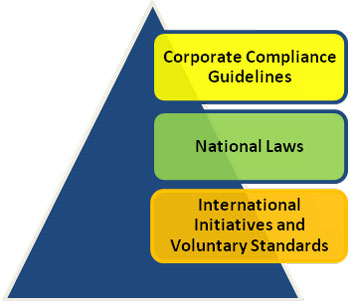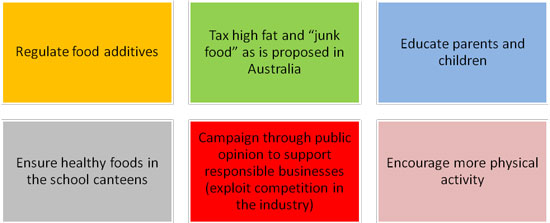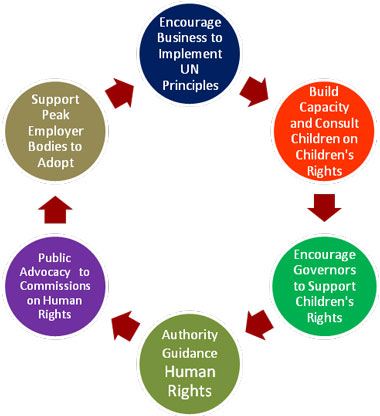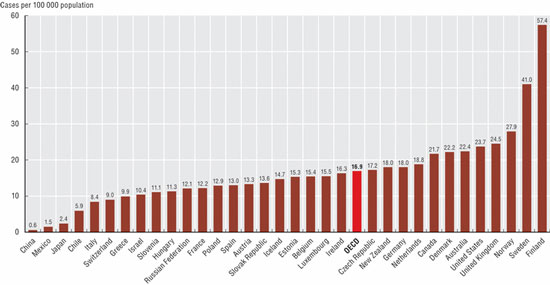Presented at the International Symposium on Children's Welfare and their Rights held by the Japanese Society of Child Science and
Child Research Net
Main Hall, Okayama Head Office of Benesse Corporation
October 14, 2013
How can Business make a Difference to the Welfare and Rights of Children?
- Part1
- Part2 (This paper)
Best Practice Characteristics
Businesses and industries that engage in best practices concerning child rights exhibit a few common features.
Firstly, such businesses and industries support transparency and lead by example.
Bribery and corruption can negatively impact human rights if it leads to the diversion of resource revenues from the broader societal needs. In this regard, it is estimated by the Canadian based organisation 'Transparency International' that bribery and corruption adds 10% globally to the cost of doing business. The consequence of this behaviour is that we all pay!
Legitimate payments by business to government (e.g. taxes, royalties, start-up fees) are a key source of revenue for governments and communities. If this obligation is undermined by corruption, then communities suffer and the children most particularly.
It is universally accepted that transparency combats corruption. As such, a healthy community needs three key platforms upon which businesses are encouraged to build transparency. These are:

Secondly, Business has the capacity to support local communities through investment and education. It is well recognised that a key to bridging the 'poverty gap' is education.
Corruption has undermined the reputation of the education sector in many countries. Almost one in five people worldwide paid bribes to education services in 2012, according to Transparency International's 2013 Global Corruption Barometer. In the world's poorest countries the number rises to one in three.
In the review conducted by 'We Comply' in 2013, four countries were identified as the least likely to use bribery when conducting business abroad. These countries were Denmark, Finland, Japan and Australia.
Conversely, the countries most likely to engage in bribery, with their scores in descending order based on the lowest index number, were: Russia (6.1); China (6.5); Mexico (7.0); Indonesia (7.1); United Arab Emirates (7.3); Argentina (7.3); Saudi Arabia (7.4); Turkey (7.5); India (7.5) and Taiwan (7.5).
Thirdly, businesses have control over their supply chain and they need to manage the supply chain to protect employees, communities and children. The Case Study provided herein, clearly demonstrates that point.
Case Study
The Case Study used to demonstrate this point was the Sherrin football company in Australia. Sherrin is an old established manufacturer, with iconic status for producing leather footballs in Australia. The balls are used in the national game of Australian Rules.
In 2012, just prior to the season end grand final, Sherrin was alleged to be supplying footballs that had been sewn by children in India. Sherrin had a contract with an Indian supplier that outsourced part of the manufacture to a second tier supplier. This second tier supplier engaged children, as young as seven, to sew the footballs.
The Australian media and the Australian Football League (AFL), the regulatory body of the game, condemned Sherrin and the AFL threatened to cancel Sherrin's contract.
Sherrin immediately terminated the supply arrangement and recalled thousands of balls, but the effect on the small Indian community and especially the children, was devastating.
Sherrin's clumsy attempt to remedy their reputational damage and protect their contract, over-reached and showed a lack of compassion for the children affected by their chain of decisions. Firstly, Sherrin failed to monitor their supply chain and ensure compliance with international labour laws. Secondly, Sherrin's panic to secure its reputation and avoid potential legal action by cancelling the contract with the Indian supplier, was condemned by the Australian community for its insensitivity in withdrawing financial support for a community dependent upon the contact. The decision exacerbated the plight of the children and their community.
With further public criticism for this action and the threat of reputational and commercial damage, Sherrin was forced to reinstate supervised contracts for the children's adult families. As such, the new arrangement became humane and sustainable. Sherrin's final actions were applauded, as they rectified their behaviour and avoided an extremely damaging commercial consequence.
Lessons Learned
The abuse of child rights can be commercially damaging apart from the ethical and reputational impact.
Public opinion and other responsible businesses can use their supply chain and consumer power to impact for the "good".
The momentum for change is now apparent with the widespread support for the UN Business Principles. Businesses generally, should heed the experience of Sherrin, especially in our age of globalisation and instant communication and the greater awareness of expected corporate behaviours and responsibilities.
Corporate Advertising and Responsibilities
Child obesity has reached epidemic proportions in developed countries and is now starting to permeate developing and third world countries. The impact is particularly significant in the child population where "sugar" in western diets is alarming and diabetes and heart disease rates are dramatically rising.
One of the most critical factors in this new trend is that children do not make the choice as to what they eat. Food manufacturers and marketers do!
Governments and business must support our children and urgently address the problem.
Source: OECD - Rates of Child Diabetes for 0-14 year olds 2010
The Adverse Effect of Advertising on Children
Studies show the indisputable fact that advertising does help push children and adolescents toward unhealthy behaviours.
The top four products sold through super-markets are fast foods, sugared cereals, sugary drinks and confectionary. All of which are having a detrimental impact upon the health of today's youth to a degree not experienced in previous generations.
Whilst children up to the age of 7 or 8 years are thought to be unable to understand the nature of advertising from a developmental perspective, they can't identify the underlying persuasive intent. Professor Thomas Robinson, Pediatrics at Stanford University stated that: "even a 30-second exposure to a novel product, one that you've never seen before, changes their preferences for brand."
What Can be Done?
Communities, government and business have a collective responsibility to ensure the health of our children. A reduction in food related health conditions could be materially improved by the adoption of a number of responsible initiatives, which are summarised hereunder.

How to Support Child Rights
As discussed in this paper business has a pivotal role in supporting child rights.
Several initiatives can be taken which will further the engagement of business in this very important transition now embraced by the United Nations through the efforts of UNICEF, the UN Global Compact and Save the Children, who jointly advocated a position on Children's Rights and Business Principles. The following schematic summarises some key initiatives:

Conclusion
Businesses can scrutinise their labour practices in the supply chain, ensure appropriate and socially responsible advertising, manufacture safe products and healthy foods, eliminate corruption as a prime business ethic, and ensure that corporate taxes are fairly paid, as they support child education, health and welfare in our societies.
The most successful businesses and most sustainable economies internationally have readily adopted a positive attitude towards child rights. Eventually, others will follow to ensure competitive success and grow the communities positively within which they operate. It is somewhat like Newton's third law of motion - "for every action there is an equal and opposite reaction".
Positive behaviour will result in positive outcomes.
| 1 | 2 |















